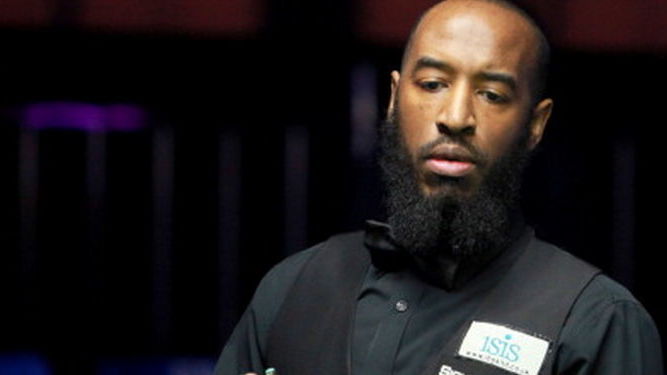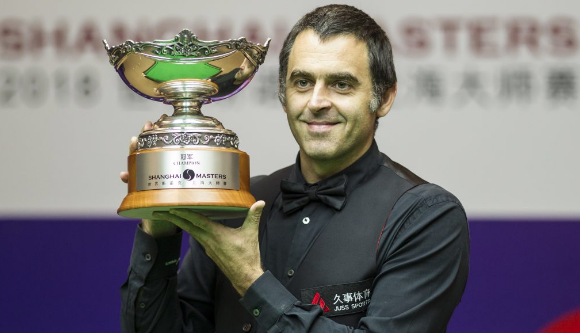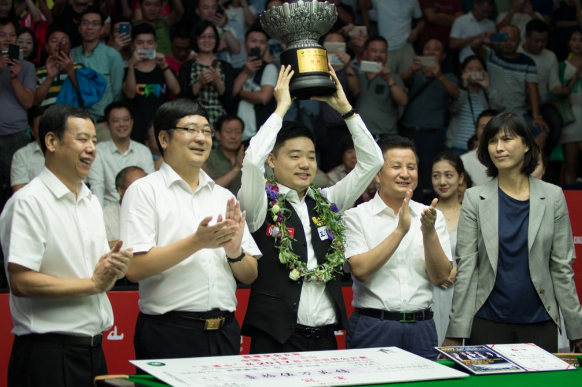- Two players are 50 years old or older.
- Three qualifiers are teenagers.
- Just one individual will be making his debut on the tour this season.
The likes of Michael White, Ross Muir, Soheil Vahedi, Ben Mertens, Brian Ochoiski, Paul Davison, Tony Knowles and Sanderson Lam failed to get back on tour this year. This shows how high-standard and tough this year’s Q School has been.
The following 14 qualifiers have earned their two-year tour card and deserve our congratulations! Any player will tell you how brutal and unforgiving Q School actually is. It’s a phenomenal feat to qualify via such a gauntlet.
Below are the qualifiers in full:
- Event 1: Peter Lines, Fraser Patrick, Jackson Page, Yuan Sijun
- Event 2: Barry Pinches, Craig Steadman, Michael Judge, Alfie Burden
- Event 3: Ian Burns, Lei Peifan, Dean Young, Duane Jones
- Order of Merit: Hammad Miah, Mitchell Mann
There have been several points of view throughout Q School.
- Do the relegated professionals have an unfair advantage over the other amateurs?
- Is there much truth in the idea that the pool of young talent is so shallow?
- Does this qualifying format continue to be fit for purpose?
Let’s go through these talking points step-by-step.
Do the relegated professionals have an unfair advantage?
It’s hard to argue otherwise looking at the list of players who qualified during this year’s Q School. Nine out of 14 qualified players booked an immediate return to the World Snooker Tour. These players have spent the last season playing professional matches on a regular basis and plenty of opportunities to practice. They usually come into Q School looking fresher than the amateurs. This is certainly the case when most amateurs didn’t have opportunities to practice, as most clubs were closed for months during the pandemic.
This year was the first time where relegated professionals were “seeded” in the Q School draws. At least this evens things out, as it is almost guaranteed that these recently-relegated players will face each other multiple times to qualify. The point of Q School is that they have as much chance as everyone else to qualify. These professionals deserve a chance to get straight back on after relegation. One could argue that if a relegated professional failed to qualify in a field full of amateurs, that might indicate that they aren’t ready to play on tour again yet.
Why is the amateur scene of young players so far behind?
As mentioned before, the lack of availability to participate in local competitions and to practice doesn’t help. Nor does the increasing waves of long-term uncertainty that is affecting young people harder during the pandemic.
But there have been concerns for many years over the lack of young players coming through in snooker. It’s great to see Yuan Sijun, Lei Peifan and Jackson Page return to the tour. But some are worried that 19-year-old Dean Young is the only rookie out of this year’s Q School qualifiers. There is also a greater annoyance among some that these young players are not able to wrestle the baton from the veterans’ grasp.
There have been many theories as to why there is a lack of young talent in snooker. These reasons include too many modern distractions, an increasing number of closing snooker clubs and even simply not being good enough. Barry Pinches recently posted that youngsters are against much tougher opposition than they were decades ago. Experience has become a more vital asset of a snooker player over the year.
There is a lot to catch up on while everyone recovers from the pandemic. The amateur scene will need a significant boost to get itself back onto its feet or the sport is in danger of losing home-grown talent.
Is Q School still fit for purpose?
Q School has prided itself as the main route to becoming a professional snooker player since 2011. Q School has attracted hundreds of international snooker players every year. Barry Hearn once said in 2020 that Q School “has proved the best and fairest way for players to qualify for the Tour.” Its most successful products include David Gilbert, Zhao Xintong and ranking-event winners Michael Georgiou and Jordan Brown. We could see future success for fellow qualifiers Louis Heathcote, Jamie Jones and Alexander Ursenabcher.
Q School is accessible to all and provides a format that caters for hundreds of amateur players. But it doesn’t guarantee that it produces the best players. This is because everyone is under monstrous pressure. A player gets three chances to peak and if one fails all three, then that is it until next season. There is a feeling that Q School churns out those who are the best at endurance rather than the best and most consistent players.
I still believe Q School to be fit for purpose. The reason why Q School receives more focus this time around is that most parts of the wider qualification structure haven’t been available due to COVID.
I think there should be more tour cards available in the Q Tour (formerly known as the Challenge Tour). It comprises events across Europe and, in theory, it would produce the best and most consistent performers. But it needs time to bed in and be run properly to make it a legitimate way to qualify for the professional tour. We will have to wait and see.
I do not own the featured image. This page was first published on Snooker Hub on Monday 14th June 2021.





Firstly, Barry Pinches is completely correct. I don’t know if he’s done the same kind of statistical analysis that I have, but there is indeed a log-jam of highly experienced players that young players stuggle to get past. We are talking around 80 players here, most are mid-ranked professionals, but many are currently amateurs, perhaps trying to get back on tour through Q School. The problem is that the new players just lose too many matches and get disheartened. Their progress stalls. Very often, if a young player does make it on tour, his second season is worse than his first, as he gets ground down by losses and ranking pressure.
Now, when you say ‘Q School is fit for purpose’, yes it is true that it produces 14 decent professionals. But apart from that, it is riddled with issues. Its one strength is that it’s simple to understand. It’s fair in that it gives everyone ‘a chance’, but the fairness is uneven – too much depends on the random draw. But I’m afraid to evaluate whether it’s the best system really requires a detailed analysis, with graphs and such like.
Let’s ignore the OM for a minute. It’s only 6% likely that the 12 top players can qualify – 94% of the time they must clash in the draws. On average, 15% of players will be outside the top-20. I could go on… The OM is especially unfair, because if two of the best players happen to meet in an early round, the loser is almost certain to be eliminated from the OM places. A Spearman correlation of the OM top-up list is pretty bad.
This is not a comment on the players and their acheivements, it’s about the structure and whether it rewards those who play the best.
Another serious problem is the constant coming and going that the players have to do. They have to make 6 trips to Pond’s Forge, and possibly have to book accommodation. It’s a huge inconvenience and expense, and they have to take 3 weeks off from their regular work.
And then in the last round, we had two players who were already assured on the OM, aganist two players who were fighting for their life. This shouldn’t happen – a match should be between players with equal incentive. OK it’s unlikely to be possible a match-fixing scenario, but if WST really are serious about such issues, they need to rule out such disincentives.
I’ve barely scratched the surface there, so I don’t think it’s a good system. I know of a system which solves all of these problems, but it’s never been considered. I’ve hacked out a demo simulation which I’ve uploaded:
http://18.132.35.235/snooker_swiss.html
I’ll leave this running for a few days, but I’m happy to share the code.
But back to the recently finished Q School. Yes, it’s once again the oldest set of qualifiers (average age 33.4, beating the 31.7 of 2019), but I really think that the covid situation has had such an effect that we can’t draw too many conclusions. Howvever, I do think we should be looking for ways to bolster the young talent if snooker is to avoid a major crisis in 10 years’ time.
Thank you for your analysis. I had talked about whether Q School is the right method of finding the best players a year but, but I didn’t want to risk sounding repetitive. Here is a link in case if you are interested: https://clusterofreds.com/2020/07/23/featured-how-successful-is-q-school-in-snooker/ – I tried a bit of analysis you might enjoy!
I still think Q School is a decent system but I do agree that it is far from flawless (cost, Uk-centric, BO7 matches, etc). In some ways, it offers too many spots on tour. Once Q Tour (if and when it starts up again) has legs, there should be more cards on offer than its usual two or three.
This is a sort of conversation I could have till the cows come home anyways!
The problem with Q Tour is that it is also very European-centric and has problems with financial viability. I don’t know how they can afford to play in it. But it also still suffers from a point-based approach, even though the draws can be seeded. If entry to Q Tour is decided by Q School’s Order of Merit, it falls short of providing a strong and inclusive amateur circuit, which is what we need, but preferably a global one. Players such as Soheil Vahedi, Si Jiahui and Bai Langning won’t be available to play in it.
Generally, a summer Q School competition does make a lot of sense, but as discussed, the existing format doesn’t guarantee the best players (i.e. those who played best during the tournament itself).
Myself, I would also prefer amateur championships to carry a tour card, as they used to do, such as ISBF, ACBS, WSF, etc. I know there are ‘differences of opinion’ between some of the organisations, but it really helps the status of a major amateur tournament to have such a reward.
Anyway, none of this is likely to happen. WST always favour cheap and simple tournament structures, and don’t consider it is their role to foster the development of the next generation of players.